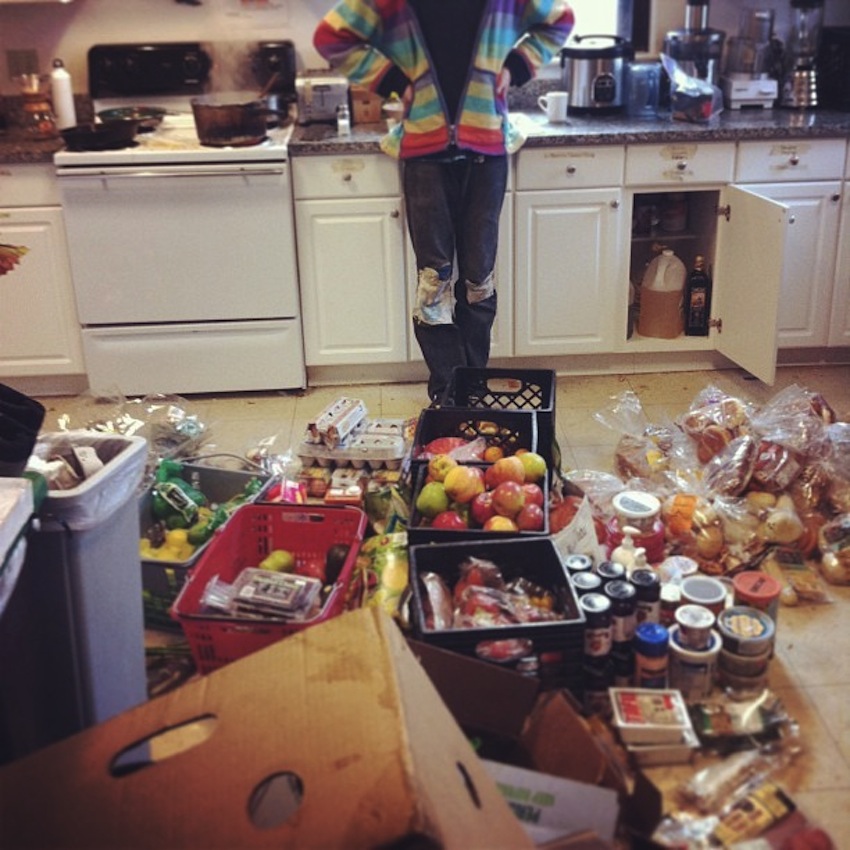Tufts Student Wants to Open a Café That Serves Food from the Dumpster
Tufts University senior Maximus Thaler has been diving into dumpsters around Boston for a while, picking out bits of produce and foods that have been tossed away as trash by big-chain restaurants and markets.
“Last summer, I started dumpster diving in various places, and I started to find that what I could locate overnight would easily value around $1,000 worth of food,” he says. “… Frequently I will be in the dumpster, and I will find a dozen eggs, and maybe one or two will be cracked. Because no one will buy a dozen eggs if two are cracked, they throw them out. [Other foods] either expire tomorrow, or have a dent in the packaging.”
So Thaler wants to dish out this vision of food wealth to others, and hopes to open a restaurant-style café and “grocery store” in Somerville. It’s the idea of turning “waste into wealth” that inspired him to set up a Kickstarter account in order to raise funds to pay for a space for The Gleaners’ Kitchen.
If Thaler meets his fundraising goal, the project will operate something like this: The café will be open 24 hours a day, with meals served daily at 6 p.m., special events on weekends, and a bicycle delivery service that accepts orders via text message. “There will always be coffee and tea and warm lentil soup,” he writes on Kickstarter.
Thaler, 22, a philosophy of science major, says he won’t charge people for the food, either, but will instead solicit donations from hungry attendees who feel like helping out. “Food is a fundamental right, and should be shared freely with all,” he says.
“People are hesitant at first sometimes, but when I come into the kitchen and people from Tufts see the food, they are always astounded,” he says.
Of course, there are challenges in trying to launch a space where food from dumpsters is served to strangers. In 1996, Congress passed a bill called the “Bill Emerson Good Samaritan Food Donation Act,” which Thaler says protects his venture from legal liability. As he writes on his Kickstarter page, “So long as neither The Gleaners Kitchen nor the grocery stores we frequent knowingly put poison in the food, it is legal for the store to give it to us, and for us to give it to [others].”
Thaler’s concept is part of a movement called “freeganism,” where people forage for free grub in dumpsters located near restaurants and food chains.
The home base for the national movement, freegans.info, describes the lifestyle as “people who employ alternative strategies for living based on limited participation in the conventional economy and minimal consumption of resources.” Based on those choices, Freegans “… embrace community, generosity, social concern, freedom, cooperation, and sharing in opposition to a society based on materialism, moral apathy, competition, conformity, and greed,” according to the group’s website.
In Boston, self-proclaimed “freegans” meet weekly to discuss the alternative lifestyle and explore the best places to find free food. Thaler’s idea and fundraiser won’t only create a space where students can grab late-night grub without shelling out a lot of cash, but it will also serve as a way for people to see an alternative lifestyle to what Thaler calls “the system.”
“I want to create a radical space to show people there are other ways of making changes in the world, rather than just protesting Washington,” he says. “Dumpster diving is a way of closing a loop and recognizing there is waste in the system.” Thaler says because grocery stores are focused on selling food as products, rather than just food to feed people, a lot of items end up in the trash that aren’t expired or even touched. “… Grocery stores throw out the food because the way the food system in America is set up.”
By raising enough money to pay utilities and rent for “The Gleaners’ Kitchen,” Thaler can provide for others while teaching them how to live resourcefully.
“I know how to cook large amounts of food on a small budget, and this is sort of an extension of that,” he says.



